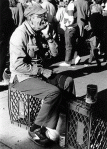
My novel Flicker in the Porthole Glass was published by MAMMOTH Books in 2002. The Review of Contemporary Fiction observed that, “…the achievement here is Desautels’s prose, an aural event both jagged and elegant, assaultive and inviting, that moves with the clipped, dangerous, urgent kinesis of hard bop jazz.” Seven years down the road, I’m going to publish Flicker here on Maximum Fiction in serial form.
Today, I give you the third chapter of Part II, The Projection Booth: “Good Friday.” Look for a new installment every Friday. Enjoy! And if you like what you see, please see my Flicker in the Porthole Glass page for information on ordering the MAMMOTH Books edition.
Good Friday

The children must take the harmonica man seriously. Arrested by this rickety vision—jaws slack, eyes over brown shoulders—they stare without make-believe shame at a wound-up, cymbal-banging monkey disguised in the costume of the bent old man who squats on an overturned milkcrate. Look at them point! Nobody will follow the indication they make because the world of the children and the world of the harmonica man exist at the level of the waist, the belt buckle, the cottage-cheese thigh, the undone zipper, the withering fart, the obscene gesture. Theirs is a strike zone world of screwballs, forkballs, changeups, and knucklers that buttresses the world of the umpires: the mothers with beefy arms who pull these kids through the city, rein them in with choke-chain jerks. Yes, mouth agape, crimped hair rising in a pigtail fountain from the crown of her head, a child jigs by on the balls of her feet. She stares at the harmonica man and I watch her: the elliptical glance over crooked shoulders: brown eyes unable to let go of the vision. Only a lazy tug on her bony arms by a mother seeking to merge into a shunpike of her own making can bring her daughter back into step on this crowded sidewalk. “Come on now! Let that crazy old man alone!” I watch as the child’s face disappears into the flagella of knees, thighs and trunks and, as my gaze wanders back to the harmonica man, I wonder just how caustic is the badge pinned to the old guy’s grimy jacket: “I ♥ KIDS.”
Beneath his caterpillar mustache, he works a Hohner mouth harp. Take a good look at the saliva already drying in a flaky ring around his lips. Like dandruff, it peppers a stubby beard that one day will be shaved with a straight razor and black medicated shaving cream that will smell like a hot bucket of roofing tar. The Italian barber will hone his razor on a strop made from the buttocks of Benito Mussolini, all the while crooning like Sinatra—the Capitol Sinatra—cool and breezy in a snap-brim hat. Faggoty, in a way. Autographed faces will beam from the barbershop walls: glossies of Sammy, Deano, Jack Kennedy, Pete Lawford, Nelson Riddle and his breezy cool orchestra—all the boys. Putting down his razor, admiring his work, the barber will hoist a glass of Canadian Club, straight up, and toast to the good health of the harmonica man: “Salute!” Everything will be swell, everything will be fine, until the barber, dizzy on Canadian Club number four, electric clippers like a hot dog in the bun of his blunt fist, bears down on the harmonica man and says: “Would ya like your eyebrows clipped?”
Read all of Installment IV. (PDF)
For more information about Flicker in the Porthole Glass, and to read installments I and II, see the Flicker in the Porthole Glass page.